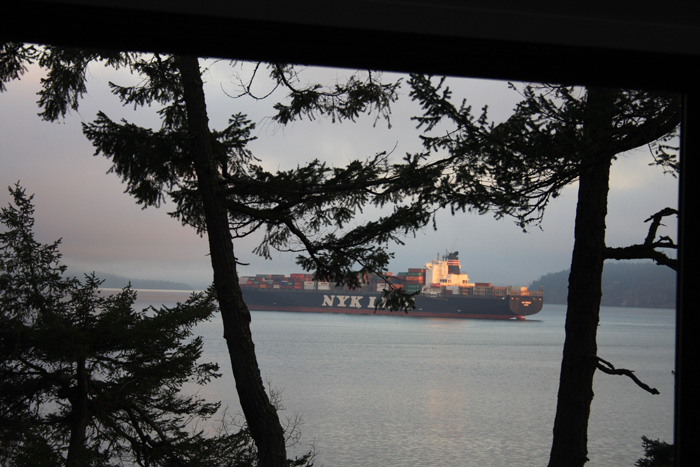By ELIZABETH MAY AND PAUL MANLY
Australia solved its freighter anchorage problem. We can too.
As Members of Parliament representing communities bordering the Salish Sea, we have worked for years to get unwanted freighter anchorages out of the waters around the Gulf Islands. First Nations, local governments and grassroots community organizations have made it very clear that the light, noise, pollution and environmental degradation caused by freighters are not welcome. But the water past the low tide mark is federal jurisdiction. Transport Canada marked 33 sites in and around the Gulf Islands as designated areas for safe anchorage. Those free parking spots are now in near constant use by foreign bulk freighters waiting to load in the Port of Vancouver.
The situation has worsened in recent years. Concerned residents deserve to know how the problem got so bad, and what we can do to remedy it.
The Port of Vancouver is very efficient when it comes to the loading and unloading of container ships. It is the shipment of goods in bulk, particularly grain and coal, that is at the centre of the anchorage problem.
In 2012, the Harper government eliminated the Canadian Wheat Board and with it went the central logistics desk for grain shipments. Prior to this decision, delivery by rail to the Port of Vancouver was efficiently coordinated. Now the system is so inefficient that grain freighters regularly make multiple trips into port and back to anchor before they are fully loaded. This is costly for grain farmers, shippers, and buyers, as well as our coastal environment and quality of life. No one benefits and many suffer.
Another piece of the freighter traffic problem is the export of U.S. thermal coal. Strong environmental regulations in Washington, Oregon and California have made it virtually impossible to ship thermal coal from western U.S. ports. Canada’s weaker environmental regulations have drawn that dirty export to our shores. As a “product in transit,” U.S. thermal coal is not subject to import tariffs, carbon taxes or other levies. The freighters waiting to receive it can arrive weeks or even months in advance and anchor for free in the southern Gulf Islands. This is madness and it needs to end.
We were pleased to second MP Alistair MacGregor’s private member’s bill to ban freighter anchorages in and around the Gulf Islands. But we recognize, as does MP MacGregor, that the bill is not workable legislation, and is primarily intended as a way to raise awareness.
We have repeatedly pressed Transport Minister Marc Garneau on this completely unacceptable situation. The increasing misuse of our waters has led to accidents. What level of catastrophe will be required to provoke Transport Canada to mandate change? And what type of change will address the root cause of the situation, rather than simply shifting it elsewhere?
Working on this issue together, we have been increasingly drawn to Australia’s approach. The Port of Newcastle had a similar freighter parking problem, until the coal ship Pasha Bunker dragged anchor and ended up on a popular local beach. There is nothing like an accident of this magnitude to motivate governments. Newcastle implemented a vessel arrival system that requires freighters to contact the port 15 days ahead of their anticipated arrival. Port authorities can then require a vessel to slow down in order to match its arrival to its loading time at the port. The system has been a success. Two-thirds of vessels loading at Newcastle no longer anchor at all, and the remainder have dropped from an average of 11 days at anchor to just three days.
The solution to the freighter problem in the Salish Sea is not as simple as legislating a ban on freighter anchorages in a specific geographical area. We must reduce the demand for anchorage. That means correcting the damage done to the grain supply chain that is costing prairie farmers upwards of $24 million per year. It means continuing to improve the efficiency of loading grain onto ships. It means banning the export of climate-destroying U.S. thermal coal from Canadian ports. And it means implementing a vessel arrival system at the Port of Vancouver, and stronger regulations and protections within Canada’s 12-mile territorial limits.
The freighter anchorage problem is fixable. It is the absence of political will to address its root causes that perpetuates this unacceptable situation.
Elizabeth May is the Member of Parliament for Saanich-Gulf Islands and Paul Manly is the Member of Parliament for Nanaimo-Ladysmith.

